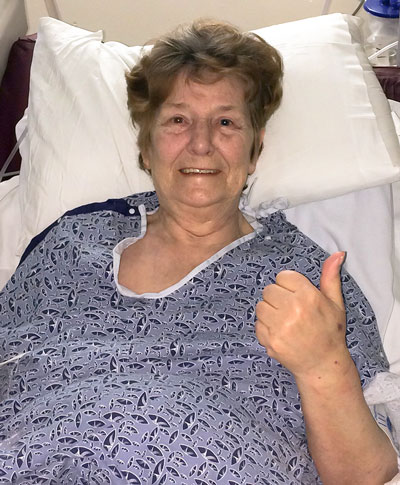
From left to right: Hunter Davis, director of Imaging Services; Archie McGowan, M.D., director of Interventional Radiology; Ajit S. Puri, M.D., neuro-interventional; Francesco Massari, M.D., Ph.D., neuro-interventional radiologist; and Matthew Kirk, PA.
Portsmouth Regional Hospital First on Seacoast to Perform Coil Embolization for Treatment of Un-ruptured Intracranial Aneurysms
Portsmouth, NH — Portsmouth Regional Hospital performed the Seacoast’s first minimally invasive coil embolization for a brain aneurysm.
Ajit S. Puri, M.D., neuro-interventional radiologist and world-renowned neuro-interventionalist who directs the minimally invasive program for brain aneurysms at UMass Memorial Medical Center in Worcester, Mass., and at Portsmouth Regional Hospital in Portsmouth, NH, performed the procedure.
The procedure involves threading a catheter into an artery and placing coils into the brain aneurysm which prevents the aneurysm from rupturing. The patient’s brain aneurysm was treated minimally invasively using a small catheter in the artery of the hand and was discharged home the next day.
“Intracranial aneurysms extend deep into the brain and can be more challenging to treat due to their size and proximity to critical structures,” said Puri. “Having advanced neuro-interventional tools such as coil embolization and flow diversion, and intra-saccular flow disruptors available to patients at Portsmouth Regional Hospital gives us a unique alternative to help patients on the Seacoast with both ruptured and un-ruptured artery aneurysms.”

Magdalena Riley gives a thumbs up after her minimally invasive coil embolization for brain aneurysm procedure. Ms. Riley was discharged on Saturday, the day after her surgery was performed.
According to the Brain Aneurysm Foundation, approximately 6 million people in the United States, or six percent of its population, have an un-ruptured brain aneurysm. When these aneurysms rupture, they are fatal approximately 40 percent of the time. Patients with large and giant aneurysms can face a particularly high risk of rupture and are often difficult to treat. Only 20 percent of these patients will have no permanent damage.
“We are thrilled to be the first hospital on the Seacoast to offer this technology,” said Dean Carucci, CEO of Portsmouth Regional Hospital.
The key to overcoming an aneurysm is early detection and interventional treatments. This requires a multidisciplinary team of neurologists, neurosurgeons, neuro-radiologists, and rehabilitation specialists who provide diagnostic, medical, and surgical management of these cerebrovascular conditions. These specialists, all working in coordination, provide specialized blood vessel and brain expertise to determine what’s best for each patient.
“The addition of this procedure to our Stroke and Brain Aneurysm Clinic complements our already robust Neuroscience and Stroke program, and further demonstrates our commitment to provide the Seacoast with highly specialized care close to home,” said Archie McGowan, M.D., director of Interventional Radiology at Portsmouth Regional Hospital.